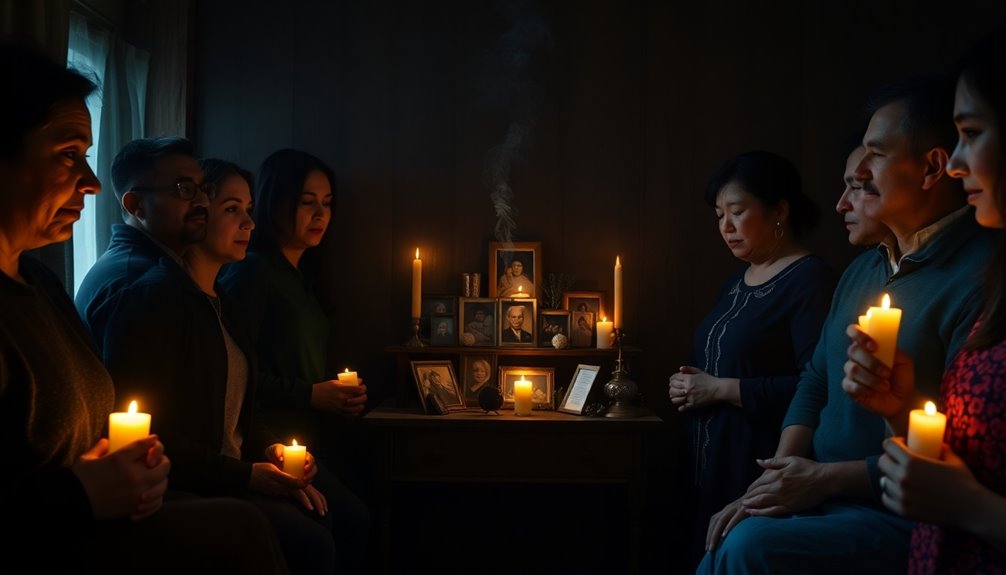When you die, you might have memories of your family. Biblical teachings suggest that some awareness of loved ones persists, as seen in passages like Luke 16, where individuals recognize their families. This enduring bond is expected to bring joy during reunions. However, it's important to know that the ultimate state of heaven emphasizes relief from earthly sorrow and pain. As your spiritual existence evolves, relationships could deepen and transform. If you're curious about the nuances of these connections and beliefs, there's more to explore about what the afterlife may truly hold for you and your loved ones.
Key Takeaways
- Scripture suggests that awareness of family may persist after death, as indicated in Luke 16 and Revelation 6:9-10.
- Heavenly relationships are anticipated to be joyful, with recognition of earthly family during reunions.
- King David's faith exemplifies the belief in enduring connections beyond death.
- While some remembrance may exist, Revelation 21:4 assures a future free from sorrow and pain.
- The ultimate focus in heaven shifts toward a deep, eternal bond with God rather than past earthly ties.
Introduction

Grief can often feel overwhelming, especially when we lose someone we love. In those moments, you might wonder about the memories your loved ones take with them after leaving this earthly life. The Bible provides some insight into this question, suggesting that while the pain of loss can be intense, there's hope in the promise of heaven.
Scripture indicates that believers might retain memories that help them appreciate God's grace and mercy. For instance, in Luke 16, the rich man recalls his earthly life and his family, suggesting that awareness of loved ones persists even after death.
Meanwhile, Isaiah 65:17 reassures us that former troubles won't be remembered in heaven, hinting at a transformative aspect of memory. Although some memories of injustices may linger, as seen in Revelation 6:9-10, the overarching promise is that sorrow and pain won't exist in the eternal state.
Understanding this can provide comfort, knowing that your loved ones can remember their connections while being free from the pain that life brought them. In this way, the hope of heaven shines through your grief.
Biblical Insights on Afterlife

In exploring biblical insights on the afterlife, you'll find that scripture offers a mix of comforting and challenging perspectives.
For instance, passages like Revelation 6:9-10 and Luke 16 highlight a retained awareness of earthly lives, while Isaiah 65:17 hints at a future free from painful memories.
Understanding these distinctions can deepen your reflection on how family connections might continue beyond death.
Primary Bible References
The Bible offers profound insights into the afterlife, shaping our understanding of memory and connection beyond death. Isaiah 65:17 reminds us that in the new creation, we won't remember our earthly lives—the former things will have passed away. This suggests a transformative experience where memories are altered or forgotten.
In contrast, Revelation 6:9-10 shows that souls in the current heaven retain memories of injustices, indicating that you might see and know certain aspects of your past temporarily. The rich man in Luke 16 highlights that immediate afterlife experiences may involve recalling family and loved ones.
However, Revelation 21:4 assures us that God will wipe away every tear, indicating a future state free from pain. This reinforces the idea that while you might remember certain things initially, the ultimate transition to eternal life may be characterized by a complete absence of sorrow.
It's possible that redeemed memories exist—those that don't carry the weight of grief. Therefore, while you might remember your family initially, the eternal state may offer a profound shift in how you relate to those memories, ultimately leading to peace and joy.
Secondary Bible References
Biblical insights on the afterlife reveal a complex relationship between memory and the soul's journey. Isaiah 65:17 tells us that in the new heaven, former troubles won't be remembered, hinting at a possible erasure of painful memories. This aligns with Revelation 21:4, where God promises to wipe away every tear, suggesting that the future will be free of sorrow and mourning.
In the current heaven, however, as shown in Revelation 6:9-10, souls seem to retain awareness of injustices, indicating that some memories persist. For instance, the rich man in Luke 16 recalls his earthly life and family, suggesting that memory exists in the current heaven, albeit differently than on earth.
This distinction between the current heaven and the eternal state is vital. While you may remember family and experiences temporarily, the eternal state will lack sorrow and painful remembrance.
Ultimately, your memories may transform, enabling a profound connection to loved ones while freeing you from the burdens of past grief. Understanding this can bring comfort as you contemplate the afterlife and your relationships beyond death.
Ancient Beliefs About Afterlife

Many ancient cultures shared fascinating beliefs about the afterlife, reflecting their views on morality, legacy, and the connection between the living and the dead.
The Ancient Egyptians believed that the deceased's heart would be weighed against a feather, determining their fate in the afterlife. This belief shaped their burial practices, emphasizing the preservation of the body to honor family memories.
In contrast, the Greeks envisioned a dual afterlife: the virtuous enjoyed Elysium, while the wicked faced punishment in Tartarus, highlighting their focus on morality and family legacy.
In Mesopotamia, the dead were thought to exist in a shadowy underworld, reliant on offerings from the living, showcasing a deep connection between spirits and their families.
Meanwhile, Hinduism introduced the idea of reincarnation, suggesting that souls are reborn into new bodies, maintaining relationships with family across lifetimes. This belief emphasizes how past actions impact future lives.
Lastly, ancient Jewish thought included Sheol, a shadowy realm for the dead, which later evolved into varying views on resurrection and the afterlife.
These ancient beliefs reveal how different cultures understood the bond between family, spirits, and the memories that linger after death.
Heavenly Perspective on Family Bonds

Family bonds take on a profound significance in the heavenly realm, where believers find comfort in the promise of recognition and connection with their loved ones. You can take solace in knowing that memories of your earthly family may remain intact, allowing for joyful recognition during reunions. Biblical examples, like King David's faith in recognizing his son, suggest that these connections transcend earthly limitations.
In heaven, the concept of family expands to include the spiritual family of God, emphasizing unity and fellowship. While painful memories might fade, the joy of reuniting with loved ones will only enhance your experience of eternal life.
Jesus' resurrection serves as a powerful reminder that relationships and bonds formed on earth can continue in a transformed state, ensuring you'll recognize those you cherished.
The anticipation of this reunion is a significant aspect of a believer's hope, illustrating the importance of fellowship around God's throne. You're encouraged to embrace the idea that, in heaven, family bonds not only endure but flourish, creating a space filled with love, joy, and everlasting connection.
Misunderstandings About Heavenly Awareness

You might wonder if your loved ones in Heaven are watching over you, but Scripture suggests otherwise.
While there's a belief that some memory of earthly life exists, it doesn't imply that they experience ongoing awareness or sorrow.
Let's unpack these misunderstandings about what heavenly memory truly means.
Dispelling Afterlife Misconceptions
Misconceptions about the afterlife often lead to confusion regarding whether deceased loved ones maintain awareness of their earthly families. Many believe that our loved ones watch over us from heaven, but scripture doesn't support this idea.
While it's true that believers may remember their earthly lives, the joy of the eternal state overshadows any sorrow. Revelation 21:4 assures that tears and pain will be absent, allowing for a transformed experience.
Hebrews 12:1 encourages you to focus on Jesus rather than lingering on connections with those who've passed. Current theological interpretations suggest that while memories may exist in heaven, they're redeemed and transformed, preventing any painful recollections from affecting your eternal joy.
Isaiah 65:17 reinforces this notion, indicating that former troubles won't be remembered in the afterlife.
Doubts About Heavenly Memory
Many people struggle with doubts about whether loved ones in heaven have the ability to watch over their families and remain aware of earthly happenings. Many believers mistakenly think that these souls retain memory and can witness life's events. However, scripture suggests otherwise.
Isaiah 65:17 tells us that former things, including past sorrows, will be forgotten in the new creation. This implies a cleansing of painful memories, allowing souls to experience an eternal state free from grief.
Revelation 21:4 reinforces this promise, stating that God will wipe away every tear and eliminate sorrow. While the current heaven may allow remembrance of injustices or relationships, as seen in Revelation 6:9-10, the ultimate eternal state emphasizes the absence of pain.
In this transformed existence, sorrow has no place, and negative memories won't persist. Ultimately, while some memory may linger for a time, the eternal state offers a profound shift where the joy of being with God overshadows all earthly grief.
Your loved ones may find peace, free from the burdens of their past, allowing them to embrace a new, joyful existence.
Family Prayer Rituals

Family prayer rituals help you cherish the memories of your loved ones while honoring their legacy.
By incorporating specific prayers or sharing stories during these moments, you create a meaningful connection that transcends time.
Memorial services can also serve as a powerful way to gather together, reflect, and support one another in your shared grief.
Cherishing Memories of Loved Ones
One powerful way to cherish the memories of loved ones is through family prayer rituals, which not only honor those who've passed but also foster a deep sense of connection with them.
These rituals create a safe space for sharing memories and expressing grief, allowing family members to support one another. By incorporating specific memories and shared experiences during prayers, you keep the essence of your deceased relatives alive in your hearts.
Lighting candles or setting up a dedicated space during these rituals symbolizes the presence of loved ones, providing comfort to grieving family members.
Sharing stories and anecdotes about your loved ones reinforces their legacy, making it easier for younger generations to remember and cherish them.
Engaging in regular family prayer rituals strengthens familial bonds and creates a supportive environment for celebrating the lives of those who've passed.
By honoring their memories together, you not only process your grief but also ensure that the love and lessons of your loved ones continue to resonate within the family. Recognizing patterns of emotional coldness in grief can help family members support each other more effectively.
In this way, prayer becomes a beautiful ritual of remembrance, weaving their presence into the fabric of your family's life.
Memorial Services for Loved Ones
Memorial services for loved ones often serve as a heartfelt gathering where you can honor and remember those who've passed away. These services frequently include family prayer rituals, offering a structured way for you and your family members to find comfort and healing together.
Depending on your cultural or religious background, these rituals can include scripture readings, moments of silence, or sharing personal memories that celebrate the life of the deceased.
During the service, you might find that family members take turns leading prayers or sharing reflections, which fosters a sense of unity and support as you navigate your grief collectively. Incorporating songs, hymns, or specific prayers that held significance to the deceased can deepen the emotional connection, making the experience more profound.
Many families discover that participating in memorial services not only helps them process their grief but also strengthens their relationships with one another.
These gatherings encourage ongoing conversations about your loved ones, allowing for respectful and loving remembrance. In this way, memorial services become a vital part of your healing journey, providing a space to honor the legacy of those you've lost.
Eternal Bonds Transcend Earthly Life

Eternal bonds between loved ones don't simply vanish with death; they evolve into a deeper connection that transcends earthly life. You may find comfort in the belief that your memory of family and relationships persists in a transformed state.
Biblical passages like Revelation 21:4 assure you that, in the afterlife, sorrow and pain are absent, allowing for pure joy in the presence of God.
The examples of Moses and Elijah during the transfiguration (Matthew 17:1-3) highlight that relationships may continue in a different form, reinforcing the idea of eternal bonds in heaven.
King David's hope to reunite with his son (2 Samuel 12:23) illustrates the belief in maintaining familial ties beyond earthly existence.
As you reflect on your loved ones, consider that while some memories may linger, the joy found in God's presence will overshadow past sorrows (Isaiah 25:8).
Furthermore, the notion of a spiritual family, as described in Hebrews 2:9-13, emphasizes that believers are united as brothers and sisters in Christ, solidifying the idea that your relationships extend beyond this life, offering you a sense of connection and hope.
Additional Resources

As you explore the enduring connections with your loved ones, you might find it helpful to seek additional resources that deepen your understanding of memories in the afterlife. One insightful book is "Heaven and the Afterlife" by Erwin Lutzer, which delves into the nature of memory in heaven and the possibility of recognizing loved ones after death.
Biblical passages also provide guidance. Revelation 6:9-10 suggests that souls may remember injustices from their earthly lives, while Isaiah 65:17 indicates that painful memories won't be part of the new eternal state. This duality raises intriguing questions about how memory functions in heaven.
Furthermore, Revelation 21:4 promises the removal of tears, pain, and sorrow, hinting at a transformation of memories into a more joyful experience in the afterlife.
By exploring various theological texts and articles that analyze these biblical implications, you can gain a better understanding of how memory might work in heaven.
These resources can help reassure you that your connections with loved ones could remain intact, allowing for recognition and a sense of togetherness in the afterlife.
Frequently Asked Questions
Will I Recognize My Family in Heaven?
You'll likely recognize your family in heaven.
Biblical accounts show that individuals maintain their identities after death, like Moses and Elijah during the transfiguration.
King David expressed confidence in seeing his son again.
Jesus' appearances after His resurrection confirm that He kept His recognizable form.
With glorified bodies, believers can expect joyful reunions and fellowship in God's presence.
Will I Meet My Loved Ones After Death?
Yes, you'll meet your loved ones after death. Many believers find comfort in the promise of reuniting with those who've passed, as biblical accounts suggest recognition in Heaven.
You'll experience joy as you worship God alongside them, forming a spiritual family that transcends earthly ties.
While memories of your past life might linger, the eternal state assures you of a future filled with happiness, free from sorrow and pain.
Will We Remember Our Lives After Death?
You might wonder if you'll remember your life after death.
Biblical references suggest that while some memories may linger, the focus shifts primarily to the joy of being in God's presence.
You won't carry the burdens and sorrows of your earthly experiences.
Instead, it seems you'll have a transformed perspective, where negative memories fade, allowing you to embrace a new existence filled with peace and joy in the eternal state.
Do We Reunite With Family in Heaven?
You'll reunite with your family in Heaven, as many believers hold onto this hope.
Scripture suggests you'll recognize loved ones and share in the joy of eternal companionship.
The Bible shows that identities remain intact, allowing for meaningful connections.
You'll experience worship together in God's presence, where sorrow doesn't exist.
This promise of reunion enhances your faith, reminding you that Heaven is a place of love, unity, and spiritual fulfillment.










